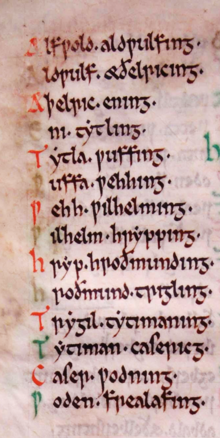Wuffinger

The Wuffingers (Old English Wuffingas ) were the royal dynasty in the Anglo-Saxon kingdom of East Anglia from the 6th to the middle of the 8th century .
Mythical origin
According to the genealogy in the Historia Brittonum ( history of the British ), the sex (fictitious) came from Wodan .
Possibly the Wuffingers come from the Swedish-Baltic sex of the Wylfinger, who are called in the Beowulfepos . Hroðmund was associated with the son of the same name of the Danish king Hrothgar . Wehha was associated with Weohstan, Wiglaf's father.
Some historians already consider Wehha († around 571) to be a historical person, while for others it is still questionable whether Wuffa is a historical person or just a mythical founder of the dynasty.
Historical dynasty
The first "historical" king was Rædwald (around 593 – around 625), who was recognized as a Bretwalda . East Anglia lost this supremacy to Northumbria after Rædwald's death . Rædwald's son and successor Eorpwald was murdered by usurper Ricbert around 627/628 . The only superficially Christianized East Anglia fell back into paganism.
Around 631 Eorpwald's half-brother Sigebert ascended the throne. He brought missionaries into the country and built a school based on the Franconian model. Sigebert abdicated around 637 and retired as a monk in a monastery. He was followed by his relative Ecgric , who had already ruled as sub-king in part of East Anglia. Both fell, as did King Anna (around 640–654) in the fight against the expansive King Penda of Mercia . Presumably Penda set Anna's brother Æthelhere (654–655) as subregulus (sub-king). Æthelhere was apparently largely dependent on Penda during his brief reign.
Under Æthelheres brother Æthelwald (655–664) East Anglia became independent again and was probably even able to exert influence on the neighboring kingdom of Essex . Æthelwald's nephew Ealdwulf (664-713) came from around 685 under the increasing supremacy of Mercias . With the death of his son Ælfwalds (713–749), the Wuffinger dynasty died out in 749.
family tree
In the Wuffinger family tree, kings are highlighted in bold.
-
- Caser
-
- Tyttman
-
- Trygil
-
- Hroðmund
-
- Hryp
-
- Wilhelm
-
- Wehha (? -571)
-
- Wuffa of East Anglia (571-578)
-
- Tyttla (578-593 / 599)
-
- Rædwald (593/599 - around 625)
- Eni († around 618)
-
- Anna (around 640-654)
- Seaxburg († 699) ∞ Earconberht I , King of Kent
- Æthelthryth (* around 636, † 679) ∞I. Tondberht ∞II. Ecgfrith , King of Northumbria
- Æthelburh (illegitimate)
- Wihtburh
- Jurmin († 654)
- Sæthryth (stepdaughter)
- Æthelhere (also Æthelric; 654–655) ∞ Hereswitha
- Æthelwald (655–664)
literature
- EB Fryde et al. (Ed.): Handbook of British Chronology (= Royal Historical. Society Guides and Handbooks 2). 3rd edition, reprinted with corrections. Cambridge University Press, Cambridge et al. 1996, ISBN 0-521-56350-X .
- Richard Hoggett: The Archeology of the East Anglian Conversion (= Anglo-Saxon Studies 15). Boydell & Brewer , Woodbridge 2010, ISBN 978-1-84383-595-0 .
- Michael Lapidge, John Blair, Simon Keynes, Donald Scragg (Eds.): The Blackwell Encyclopaedia of Anglo-Saxon England. Wiley-Blackwell, Oxford et al. 2001, ISBN 0-631-22492-0 .
- Sam Newton: The Origins of Beowulf. And the Pre-Viking Kingdom of East Anglia. New edition. Boydell & Brewer, Woodbridge 2004, ISBN 0-85991-472-0 .
- Barbara Yorke : Kings and Kingdoms of Early Anglo-Saxon England . Routledge, London-New York 2002, ISBN 978-0-415-16639-3 . PDF (6.2 MB)
Web links
- The Kings of the East Angles in Foundation for Medieval Genealogy
- Dr Sam Newton's Wuffing website
- William of Malmesbury : Chronicle of the Kings of England from the earliest period to the reign of King Stephen , Book 1, "Of the kings of the East Angles" in English and Latin
Remarks
- ↑ Paul Halsall: Medieval Sourcebook: Nennius: Historia Brittonum (1998, English translation)
- ↑ a b Calvin B. Kendall (Ed.): Voyage to the other world: the legacy of Sutton Hoo , University of Minnesota Press, 1992, ISBN 978-0-8166-2024-1 , p. 56.
- ^ Martin OH Carver: The age of Sutton Hoo: the seventh century in north-western Europe , Boydell, 1992, ISBN 978-0-85115-361-2 , pp. 70-74.
- ↑ Frank Merry Stenton (Author), Doris Mary Stenton (Ed.): Preparatory to Anglo-Saxon England: Being the Collected Papers of Frank Merry Stenton (= Oxford Scholarly Classics ), Oxford University Press, Oxford 2001, ISBN 978-0- 19-822314-6 , p. 398.
- ↑ Sam Newton: The Origins of Beowulf: And the Pre-Viking Kingdom of East Anglia , Boydell & Brewer, 2004, ISBN 978-0-85991-472-7 , p. 105.
- ^ A b Nicholas J. Higham, The Kingdom of East Anglia , in: Lapidge et al. (Ed.): The Blackwell Enzyclopaedia of Anglo-Saxon England , pp. 154-155.
- ↑ Beda, HE 2.15
- ↑ Beda, HE 3,18
- ↑ Frank Merry Stenton (author), Doris Mary Stenton (ed.): Preparatory to Anglo-Saxon England: Being the Collected Papers of Frank Merry Stenton (Oxford Scholarly Classics), Oxford University Press, 2001, ISBN 978-0-19- 822314-6 , p. 400.
- ↑ Barbara Yorke: Kings and Kingdoms of early Anglo-Saxon England , Routledge, 2002, ISBN 978-0-415-16639-3 , p. 65.
- ^ K. Wade: East Anglia ; In: Heinrich Beck , Dieter Geuenich and Heiko Steuer (eds.): Reallexikon der Germanischen Altertumskunde, Volume 6 , de Gruyter, 1986, ISBN 978-3-11-010468-4 , p. 328.
- ↑ Evidence on family relationships and government or life data are included in the biographies.
- ↑ Æthelric is probably a misspelling for Æthelhere in the Anglian Collection . See EB Pryde, DE Greenway, S. Porter, I. Roy (Eds.): Handbook of British Chronology (Royal Historical Society Guides and Handbooks) , Cambridge University Press, 1996 (3rd edition), ISBN 978-0-521- 56350-5 , p. 8.
- ↑ Sam Newton: The Origins of Beowulf: And the Pre-Viking Kingdom of East Anglia , Boydell & Brewer, 2004, ISBN 978-0-85991-472-7 , p. XIII.